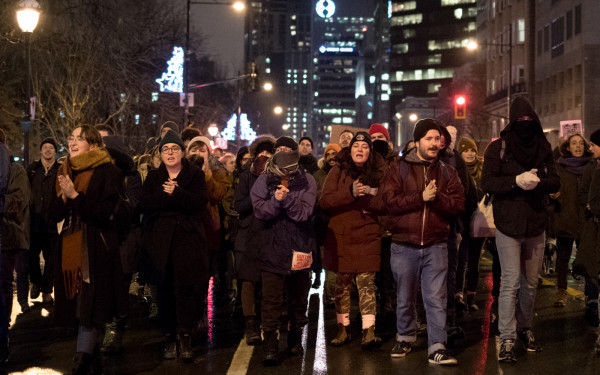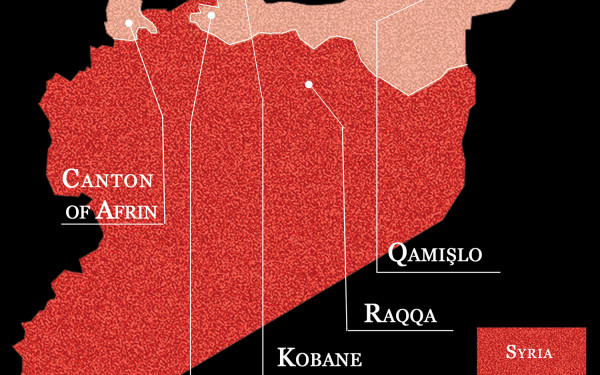The Stories We Tell
Changing the Narrative at the World Social Forum in Montreal
On my way into town this morning, I was listening to the news on the radio.
The stories I heard about were a death by terror, a death by accident, and—good news—a failed kidnapping. I’m bombarded with so many messages saying how the world is full of bad people doing bad things that I start to lose faith.
We’re told a lot of depressing stories, but they are not the only stories happening in the world right now. When the endless repetition of violence and suffering gets you feeling down and hopeless, the only way out is to look for the good in the world.
The World Social Forum, an initiative spawned in Brazil in direct opposition to the World Economic Forum, goes beyond simply looking for good. The WSF gathers as many different people and organizations trying to create a different, kinder world together as possible. For every bad thing that happens in the world, groups such as those present at the WSF are actively working to do good.
The World Social Forum held its yearly event this year in Montreal—the first time it has ever been held in the Global North. Over 1,500 independent organizations and movements came together for six days, ending the forum on Sunday, Aug. 14. Samuel Raymond, one of the organizers of the WSF 2016, explained that holding the Forum in the Global North was meant to create dialogue about the power imbalances that exist between both hemispheres.
Although this imbalance was apparent in the fact that many would-be participants were refused entry visas into Canada, Raymond believes it was nonetheless necessary to host the Forum in the North. The focus was on creating a reflection in developed societies of how our lifestyles, and the decisions we make, have an impact around the world.
“We are in an interconnected system,” said Raymond. “If we didn’t bring the forum up north, then the southern communities would be rallying and organizing themselves, all while most of the impactful economic decisions, unfortunately, are being made here.”
By presenting this portrait of the world, WSF organizers hope that residents of wealthy countries perceive their actions, and the actions of their governments, from a different perspective.
A New Story
At the forum, thousands of people were challenging the hopeless narrative that we have about our world.
David Gray-Donald, an editor for the autonomous initiative the Media Co-op, came to the WSF to distribute the summer 2016 edition of The Dominion, a grassroots news magazine. For him, the WSF was a good place for people to hear from others who are attempting to build a world outside the global-capitalist status quo we experience today.
“It’s hard to have an anti-imperial perspective when you’re from an imperial nation,” he remarked.
“A lot of people get to interact, a lot of good meetings [happen], and that’s powerful—but I’m a bit saddened that because of the visa situation, there’s a bit less of that, [and it’s] a bit less fruitful,” he continued.
Eda Duzgun, from the International branch of the Kurdish Women’s Movement—operating at the forum under the banner of the Kurdish Network—succeeded in coming from Paris for the WSF.
Although the Kurdish Network has been involved with the Forum since its inception in 2001, three of her friends were refused visas by Immigration Canada. Nonetheless, Duzgun views this only as a step backward in an otherwise successful march forward.
“I hope that Montreal will know that everyone doesn’t have the same chances and opportunities as they have, and …I hope that this will maybe strengthen the sympathy with other people,” she said.
Duzgun remains assured that the proliferation of spaces like the World Social Forum is a sign of growing opposition to the capitalist world system, because it encourages people to share.
“We can build a common economy, new economic perspectives, discuss about that, how to develop new cultures, new identities, how to develop a new life,” she said, adding that that’s what her organization is doing in Rojava, the Western territory of Kurdistan, situated in northern Syria.
“We believe the forum can spread thoughts like this into the rest of the world.”
Nathalie Morrand, an Atikamekw of the Manawan First Nation north of Montreal, was at the forum with her partner Jean-Louis Newashish, who maintains his late father Cesar’s ancestral canoe-building traditions. The World Social Forum—as a sharing space—was perfect for Morrand, because she wanted to show that her people and all other Canadians are sharing a larger space.
“We’re here, that’s all. It’s not about victimization or finding out who’s at fault, we’re here with our heavy past, yes, but we are proud, we want to share everything,” she said.
Morrand believes that the spirit of the WSF, as a global movement of change, is neither far-fetched nor difficult. She simply hoped to have an effect on people’s attitudes toward indigenous groups and to transmit the values of peace, forgiveness and forward-drive that she is sure we already have in common.
The World Social Forum 2016 was an opportunity to change the narrative. There’s a lot of bad news being told on the radio, on the television, in the newspapers. Yet somehow, there is a lack of reflection on how our actions are generating these situations—and how a change in those actions can make us part of the solution.
While the WSF aimed to make these connections apparent, its end goal was to give people a space to create collaborative solutions. This doesn’t mean pointing blame, but rather taking responsibility for our own actions, strengthening our sympathies, and getting to know one another as the different peoples of the earth.
Mass media, the platform through which many of us learn about the world, addresses us as mere observers of a chaotic human sphere—but we are not powerless. So when you start feeling hopeless, helpless, or simply tired with the state of our human planet, just remember that there are people working hard to make it right, and there’s nothing stopping you from being one of them.





web_600_375_90_s_c1.jpg)
